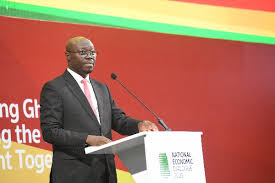
Adnan Adams Mohammed
As government declares its resolve to managing Ghana’s debt sustainably, Dr Cassiel Ato Forson, the finance minister has agreed to the proposals of some economists with regards to legislating a public debt ceiling ratio and instituting a fiscal responsibility council.
In his proposal at the National Economic Dialogue 2025, the Director of the Institute of Statistical, Social and Economic Research (ISSER), Professor Peter Quartey, called for the establishment of an independent fiscal responsibility council with real enforcement powers and a legislated debt ceiling of 60% of Gross Domestic Product to ensure prudent economic management.
The revered economist explained that, Ghana’s borrowing patterns in recent years have been unsustainable, with funds largely spent on recurrent expenditure and interest payments rather than productive investments. Thereby he cautioned that, without stricter fiscal discipline ,the country risks worsening its economic vulnerabilities.
“Ghana spent a greater proportion of borrowed funds on recurrent expenditure and interest payments, especially in the last few years. Therefore a greater part of the debt accumulated was consumed rather than channeled into productive investment”, Prof Quartey further noted at his inaugural lecture at the Ghana Academy of Arts and Sciences, last week, on the topic “Debt, Investment, and Growth in Ghana: Did We Borrow to Consume?”.
“Fund’s investments were not effectively utilized due to a lack of competitive bidding and poor procurement practices. What is the way forward? One is to legislate a debt ceiling – a debt to GDP ratio of 60%. ECOWAS is proposing 70% but I think that is too high because if you slip from 70%, you are likely to get into the 80’s and we will cry for a debt exchange and restructuring.
“We certainly have to practice prudent financial management and establish an independent fiscal responsibility council; an independent one that can bite”, he said.
Consequently, Dr. Cassiel Ato Forson, at a high-profile meeting with managing directors of commercial banks in the country last week, announced that the government will be submitting a fiscal responsibility rule legislation to Parliament, setting a debt ceiling that the Ministry of Finance cannot exceed.
This move, he said, is part of efforts to entrench fiscal discipline and restore macroeconomic stability.
“As part of our commitment to fiscal discipline, we will be submitting to Parliament a fiscal responsibility rule and a debt ceiling that the Ministry of Finance cannot exceed,” he disclosed to the Managing Directors of commercial banks operating in Ghana.
“We are making massive investment cuts and resetting goods and services expenditure to 2023 levels. Our target is clear: achieve a primary surplus of 1.5% as we work to consolidate our gains and rebuild confidence.”
Moreover, Dr. Ato Forson expressed concerns about the country’s external debt service obligations.
Over the next four years, Ghana is expected to pay a total of US$8.7 billion in debt servicing, which represents 10.9% of the country’s GDP. The largest payments are expected to be concentrated in 2027 and 2028.
On the Domestic Debt Exchange Programme (DDEP), the Finance Minister assured that the government has no intention of defaulting.
“We do not intend to default. All outstanding holdouts have been paid, and we have built enough buffers to fully meet our DDEP obligations this year” he emphasized.
He also highlighted efforts to reduce reliance on Treasury bills and enhance policy coordination between fiscal and monetary authorities.
“We are also taking deliberate steps to reduce our reliance on the Treasury bill market and strengthen policy coordination between fiscal and monetary authorities. Stability is our priority, and we will not return to the turbulence of 2022. We will not be reckless,” he assured.
Dr. Forson acknowledged the crucial role of the banking sector in Ghana’s economic transformation and reaffirmed the government’s commitment to working closely with financial institutions.
Meanwhile, Kwamina Asomaning, President of the Ghana Association of Banks (GAB) and CEO of Stanbic Bank Ghana speaking at the meeting applauded the government’s budget for 2025, highlighting positive market reception and pledging the banking sector’s support for financial inclusion and capital market development.
In a related event, the Presidential Advisor on the economy, Seth Terkper, has defended the government’s 2025 budget, calling it a necessary step to implement austerity measures aimed at addressing the country’s external debt.
Terkper highlighted the evolution of Ghana’s debt portfolio over the years and stressed that alternative solutions will be crucial to prevent defaulting on external debt payments between 2026 and 2028.
“As we speak, we’ve just cleared the first (bond debt servicing payment), and three more major ones are ahead. For instance, one of them is an outlier, but the years 2026, 2027, and 2028 will be crucial. We must find a solution—whether through paying down the debt or refinancing”, Terkper said at the farewell ceremony honouring Simon Madjie, the former Executive Secretary of the American Chamber of Commerce-Ghana, now appointed as the Acting CEO of the Ghana Investment Promotion Centre (GIPC).
“Otherwise, there is a rare possibility of defaulting for a third time. That’s the reality, and this is the concern driving the tough austerity measures in the current budget,” the former finance minister stated.